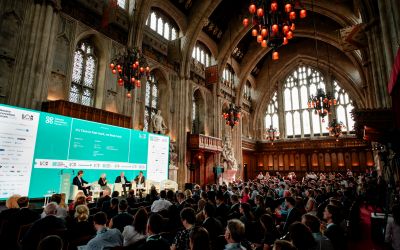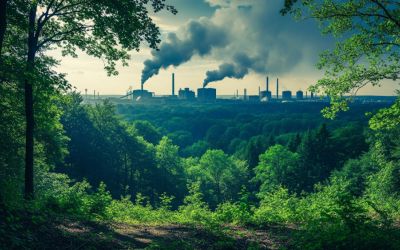Interview with Erik Solheim, Head of UN Environment
Climate Action is delighted to feature an exclusive interview with Erik Solheim, the newly elected Head of UN Environment.

Following an extensive career focusing on environment and development in government and international organisations, Erik Solheim was elected to become head of UN Environment on May 13, 2016. He took the reins of the world’s leading global environmental authority in June, and Climate Action is delighted to feature an exclusive interview with the inspirational ‘Green Politician’.
Leading UN Environment into the future at this critical juncture in history carries with it great expectations. What is your vision for the organization?
At UN Environment, we have a unique position and opportunity to bring together governments, businesses, scientists, civil society and the public. We can inspire, influence behaviour and policy, and help shape the way forward with good science and knowledgeable experts. But while we have great science, we need to translate that science into a language that everybody can relate to. For example, pollution is one of the main causes of death in the modern world – and by helping improve air quality we can also have a big impact on climate change. In other words, we have to better connect with people so that they can act, and encourage their governments to act.
What is it about UN Environment that inspired you to want to become its leader?
Every single one of the UN’s Global Goals is linked to the environment – from ending hunger to achieving gender equality and building peace. We have an enormous responsibility and a huge potential for impact. We are an organisation that is not only calling out the problems, but also putting forward solutions to air pollution or the overwhelming amount of plastic in the oceans. We will drive green finance and build upon the love we all feel for beautiful Mother Earth. We aim to be a can-do organization!
Do you have any reservations about taking on the role? What do you feel will be your greatest challenge as Head of UN Environment?
The chief concern is that we’re on a tight schedule. Contrary to belief the world is rapidly progressing in nearly all regards. But we need to speed up. UN Environment is a small organisation when you think that we are working for the entire planet. So everything we want to achieve will require partnerships - with governments, business or citizens. We need to push forward on a whole host of initiatives – like using the Montreal Protocol on the Ozone layer to help tackle climate change by phasing out climate gases from refrigerators and air conditioning systems. The Kigali agreement was a great victory in that regard.
What do you believe is Achim Steiner’s greatest legacy from his 10-year tenure?
Achim’s legacy is really a body of work that has made UN Environment more focused and trusted by donors and governments. UN Environment was upgraded to universal membership during his tenure, and our work has been placed at the heart of the Global Goals. He has helped us pioneer work on the green economy and sustainable finance. Working with the Nigerian government on the oil clean-up of Ogoniland is an example of how to affect the lives of many people. The soon to be in force Minamata Convention on mercury is another. We can see the results of his work in the Paris Agreement and the Kigali Protocol, and from the financial markets to the mountains of Afghanistan.
You previously held the position of Norway’s Minister of the Environment and International Development. How can the rest of the world learn from Norway’s commitment to climate change and the environment?
My country Norway has advanced some great green initiatives and ambitions. The global initiative to reduce emissions caused by the destruction of rainforests is probably the most well-known. Here, Norway partnered with Brazil and many other Latin American nations, with Indonesia and beyond. Norway also has the highest per capita number of electric vehicles, thanks to tax holidays and preferential treatment in traffic. My hometown of Oslo is now aiming to halve greenhouse gas emissions in the next four years. But still Norway can do a lot more. And for sure - there are inspiring examples and a lot to learn from all continents.
You have stated that two urgent areas we need to address are creating jobs and markets with clean and green technologies, and transforming the sustainable finance landscape. Why is this, and how can UN Environment help in these critical areas?
One of the main reasons for resistance to change is fear of how it will impact existing economic models. There’s a perception that doing the right thing is too expensive, or that preserving our planet is not compatible with development. This is wrong – and we all instinctively know that it’s wrong – so we have to create the conditions in which change can happen by fixing the parameters. We need to demonstrate the low-carbon economy makes sound economic sense, and that sustainability is good business.
UN Environment has been working for decades with financial institutions, banks and investors. Most recently, our Inquiry project has worked with finance ministries and central banks to promote green finance, and take environmental considerations into risk assessments and investment decisions. Taking care of the planet is not an obstacle to development, it's a business opportunity. It creates interesting, good green jobs.
You have a strong focus on business. Do you plan to strengthen UN Environment's collaboration with the private sector? And will you consider only working with companies who have endorsed the UN Global Compact Principals?
The United Nations should work with all companies and all governments, and this doesn’t mean that we agree with all governments or companies. I want to speak positively of companies that are doing well because other companies can learn from them. Let us name and fame. If they do less well, then we should be prepared to name and shame. Working with the private sector is simply common sense and recognizing that the private sector is where many of the technologies and solutions of tomorrow will come from, and that we need to be present in that space. We need to be there to help with our expertise, but also to listen and learn. You will see us partnering a lot more with business.
COP22 in Morocco will mark a turning point for climate change as the landmark Paris Climate Change Agreement will enter into force. What are your expectations for the Conference and its immediate aftermath?
Our Moroccan hosts are framing this as an action meeting that will build on negotiations in Paris. I share that optimism. In a broader sense, we have to build on the momentum from Paris and accelerate the change. Things are moving in the right direction, but not nearly as quickly as they need to. More specifically, we have to work on addressing two big holes in the process: the emissions gap and the finance gap. We need to cut emissions more than we have agreed up to now, and we need to turn the big investments green.






